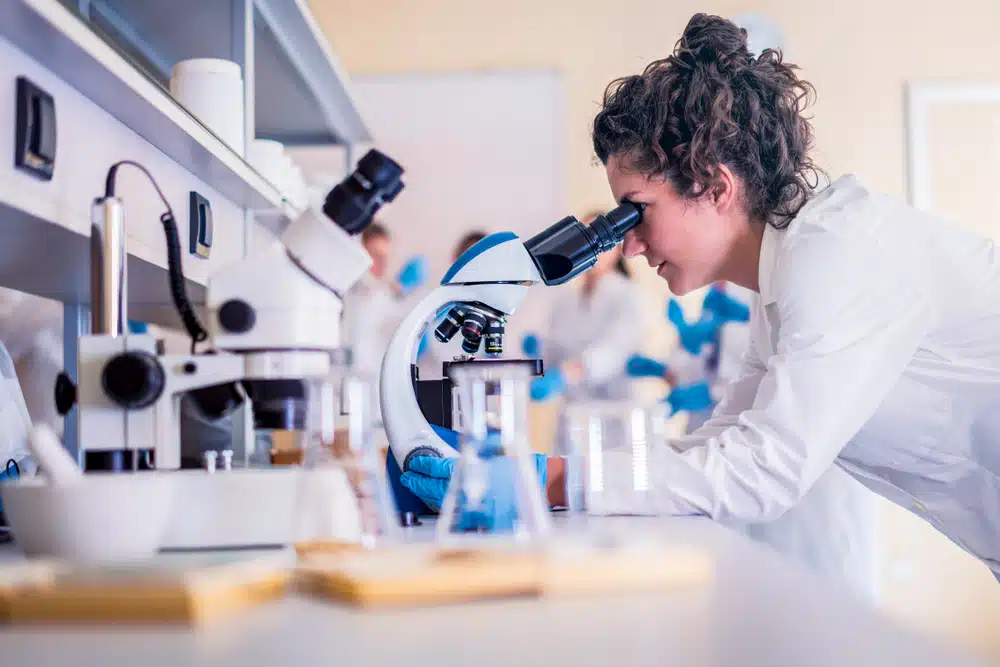15 Best Forensic Science Colleges
In this day and age of real crime documentaries, television shows, podcasts, books, and virtually every other form of entertainment, forensic science has emerged as a topic of fascination for millions of people. If you have a strong interest in either science or the investigation of crimes, then forensic science can be an excellent topic of study for you to consider. In this article, we will take a look at the top forensic science colleges in the country, which are designed to educate students to become professionals in the field of forensic science.
What is forensic science?
To begin, let’s define what forensic science actually is. The criminal justice system places a significant emphasis on the application of forensic science. It is also a stimulating and gratifying major, and it is a field of study that may be pursued at the undergraduate level at a wide variety of colleges and universities.
The field of forensic science is not a single discipline but rather an interdisciplinary amalgamation of areas such as biology, chemistry, law, and computer science. Technicians in forensic science play an essential part in the operations of law enforcement agencies and the legal system.
Today forensic science is one of the most popular and sought-after job pathways in the field of criminal justice in the United States. This field encompasses everything from chemistry and biology to forensic psychology and digital forensics.
Forensic science career
Embarking on a career in forensic science opens the door to a world of intriguing possibilities. Rooted in the intersection of science and criminal investigation, forensic experts play a vital role in unraveling mysteries and bringing justice to the forefront. These skilled professionals meticulously analyze evidence – fingerprints, DNA, or trace substances – to reconstruct events and unveil hidden truths.
Students interested in pursuing a career in forensic science have a wide variety of specific job opportunities and specialized degree programs from which to select. Archaeology, geology, pathology, psychology, toxicology, accountancy, and a host of other academic disciplines are some of the fields that can lead to a successful career in forensic science.

In addition, graduates of degree programs in forensic science have the opportunity to work in a variety of career contexts, such as local, regional, state, and federal labs and agencies. Graduates of forensic science programs can find work in various settings, including hospitals, military branches, police departments, and commercial organizations.
Pursuing a forensic science career demands a strong foundation in relevant scientific disciplines, critical thinking, and an unwavering dedication to truth-seeking. It’s a path that invites those passionate about unraveling enigmas, ensuring society’s brighter and safer future.
What are the best forensic science colleges?
When compiling this list, we considered a lot of different aspects, including the following:
- Status of the program in society
- Overall rating of the school
- Earnings that are typical for graduates of this major or program as a whole
- The degree to which the major is sought within the institution
- The proportion of the program’s size to that of the school
15 Best Forensic Science Colleges
1. University of Pennsylvania, abbreviated as Penn State
The Forensic Science program at Penn State is an inter-college collaboration between several different academic units. It provides a foundation in areas such as the biological, physical, and mathematical sciences, as well as topics in criminalistics, forensic chemistry, forensic biology, crime scene investigation, and social sciences.

Students can concentrate their studies in either biology or chemistry as part of their degree. They have access to a crime laboratory that is on the cutting edge of technology as well as training facilities for crime scenes.
2. Saint Louis University, abbreviated as SLU
To provide students with a comprehensive understanding of the intersection of law and science, Saint Louis University’s forensic science major makes use of the methodologies, instruments, and points of view of the fields of biology, chemistry, anthropology, sociology, physics, mathematics, and medicine.
When they graduate, students will have a comprehensive understanding of scientific technique as it relates to a wide variety of businesses.
Students can participate in fieldwork internships and/or independent research at different sites thanks to the department’s contacts with forensic science laboratories in the metropolitan area of St. Louis, where they can also do independent research. In this facility, students can take a class on crime scene investigation, and the Forensic Science Club meets here.
3. George Mason University
The Bachelor of Science in Forensic Science degree program at George Mason University allows students to investigate various subfields within the larger field of forensic science. These subfields include both area and laboratory applications and may include topics such as crime scene investigation, forensic DNA, forensic chemistry, trace evidence, firearms examination, fingerprints, arson, and drug analysis.
Students have the option of specializing in either Forensic Biology or Forensic Chemistry, both of which provide an engaging and practical education.
Because the university maintains partnerships with various forensic science agencies and labs, including the FBI, its students are allowed to obtain practical experience in contemporary settings. Without question, George Mason University is among the best forensic science colleges.
4. John Jay College of Criminal Justice at the City University of New York
Three subfields can be pursued within the Forensic Science major: Molecular Biology, Criminalistics, and Toxicology. Students, regardless of the area in which they choose to concentrate, acquire abilities in a variety of areas, including research, scientific communication, data collection and interpretation, concepts in the physical and biological sciences, and more.
Students are expected to participate in an internship as a component of the educational curriculum. In addition to this, they will have access to a wide variety of chances for learning through experience.
5. The University of Central Florida, often abbreviated as UCF
Students in the forensic science program at UCF have the option of pursuing either a biochemistry or chemistry concentration, providing them with two distinct perspectives from which they might approach the study of the field.
Students are taught how to write scientifically, undertake and assess scientific investigations, and the function they will play in the judicial system when they graduate. In addition to that, they will acquire practical experience through working in cutting-edge laboratories.
6. Hofstra University
The fundamentals of chemistry, biology, physics, mathematics, the legal system, psychology, and even photography are taught to students in Hofstra’s Forensic Science department, which is an interdisciplinary study.

Students have hands-on experience with tools used in contemporary forensic laboratories thanks to the university’s laboratories equipped with cutting-edge technology. Students are also allowed to participate in research, internships, and peer teaching, among other experiences.
7. Loyola University Chicago
One more among the best forensic science colleges is Loyola University Chicago. Students in the Forensic Science program at Loyola will acquire a breadth of knowledge in a variety of scientific disciplines, including chemistry, biology, mathematics, and physics, as well as an awareness of the structure of the legal system, technological ability, and a variety of other skills.
Students learn about patterns, biology-DNA, and chemistry in laboratories that are up to date with the latest technology. Forensic Education Programs Accreditation Commission has conferred their seal of approval upon the program (FEPAC).
8. Syracuse University
Students at Syracuse University can earn an Integrated Learning Major (ILM) in Forensic Science. This major is designed to supplement a variety of other majors by introducing students to the field from various perspectives and challenging them to apply their knowledge to various academic fields.
Students will benefit from comprehensive lab resources while engaging in various academic activities, including real-world field experiences and diverse coursework. The Forensic and National Security Sciences Institute calls this particular educational establishment its home.
Majors in forensic science are also strongly encouraged to pursue studies in other countries.
9. UT Austin, also known as the University of Texas at Austin
Students at UT Austin interested in pursuing professions in forensic science can gain an interdisciplinary perspective by earning a certificate in forensic science from the university. All undergraduate students are entitled to participate.
At the University of Texas at Austin, students also have the opportunity to participate in the debate and forensics program, which was first established in 1883 as the Athenaeum Literary Society. This is why it is considered one of the best forensic science colleges in the country.
10. Texas A&M University
Students in the Forensic and Investigative Sciences program at TAMU, which is one of only two bachelor’s degree programs in the state of Texas to hold national accreditation from FEPAC, receive an education with a focus on the life sciences.
This education helps students develop concrete skills and uses cutting-edge technology to learn the ins and outs of the field. Students have the option of pursuing either a Science Emphasis track or a Pre-Law Emphasis track at their educational institution (non-FEPAC accredited).
11. University of Nebraska–Lincoln | UNL
The forensic science program at UNL provides students with the technical knowledge and hands-on students gain benefits from having smaller class sizes, which encourages them to form ties with people working in the industry who can act as mentors and leaders. They also can participate in research, capstone experiences, and internships during their time here.
12. The Virginia Commonwealth University, also abbreviated as VCU
The Bachelor of Science in Forensic Science degree at Virginia Commonwealth University equips students with the knowledge and hands-on experience necessary for them to be successful in a profession in the field of forensic science.
Concentrations in Forensic Biology, Forensic Chemistry, and Physical Evidence are available to students in this program. Internships offer students of all academic disciplines the opportunity to earn academic credit while gaining practical experience in a variety of fields, including the forensic sciences.
13. The University of Towson
Students who choose to major in forensic chemistry at Towson University will be well-prepared for jobs as working scientists in business, industry, and government, as well as for additional graduate study.
The application-oriented curriculum helps students in several majors improve their laboratory skills as they apply to forensic analysis. The general forensic science track, the trace evidence/drug analysis track, and the DNA track are the three options students can choose from.
14. San Jose State University, abbreviated as SJSU
The Forensic Science program of the Department of Justice Studies grants Bachelor of Science degrees in the fields of Forensic Chemistry, Forensic Biology, Digital Evidence, and Crime Scene Investigation (CSI).
The American Academy of Forensic Sciences has determined that each curriculum satisfies the requirements for accreditation as a forensic education program. In addition, San Jose State University provides students with the opportunity to pursue a Minor in Forensic Studies.
15. The West Virginia University, also abbreviated as WVU
Students at West Virginia University can earn a Bachelor of Science degree in Forensic Biology, Forensic Chemistry, or Forensic Examiner. Students who choose any of these routes will receive a comprehensive education in the fundamental sciences and the practical applications related to forensic science.
The Forensic Education Programs Accreditation Commission has granted accreditation to each and every program (FEPAC). Students are required to participate in an internship as a part of the requirements for their degree.
How to pick the best forensic science colleges?
How to pick the best forensic science colleges? In the process of selecting a location to pursue a degree in forensic science, it is essential that you choose a good program that is accredited in forensic science. You wouldn’t want to enroll in a program that isn’t verified and end up with a mediocre education or training, would you?

Evidence analysis is a difficult field that calls for specialized knowledge and extensive training. In addition to this, the job market in this industry is quite competitive, which means that in order to gain an advantage over other candidates, one needs to have a good education.
Checking to discover if a forensic science program has earned FEPAC accreditation is the most reliable method for determining whether or not it is worth the student’s time. The purpose of the Forensic Science Education Programs Accreditation Commission is to ensure that forensic science education continues to meet rigorous requirements.
For a program to be granted forensic science accreditation, such a program must comply with the rules that FEPAC has established.
Although there is a wide variety of opportunities, it is essential to enroll in a school or program that has been granted FEPAC accreditation. In the absence of a program that has been granted accreditation by FEPAC, the graduate will have a significantly reduced number of career opportunities.
AdmissionSight provides a number of different counseling and tutorial programs that could assist you in selecting and enrolling in the school that is the ideal fit for you. Because the professionals at AdmissionSight have worked in the field of college admissions for the past ten years, we can guarantee that the service that we provide will be of the highest possible standard. Book a free initial consultation to learn more.





































